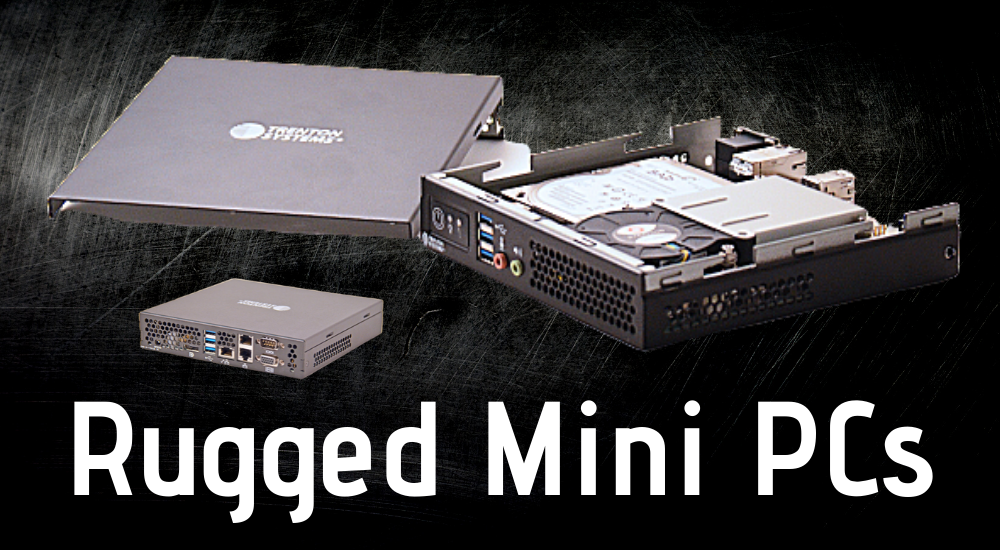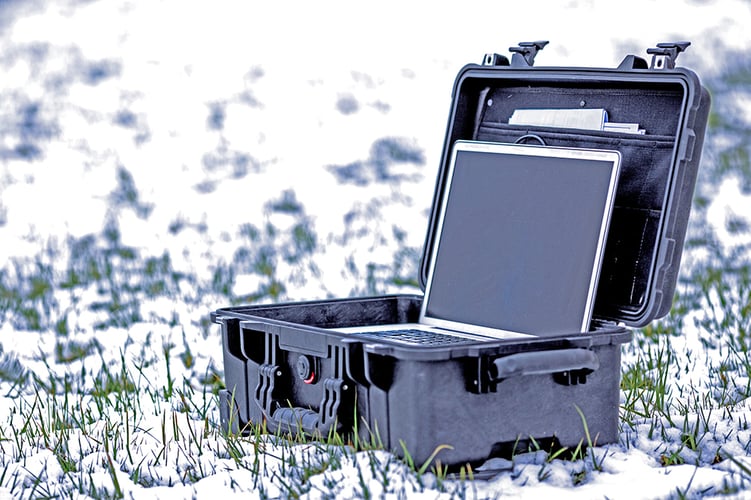Share this
Rugged Mini PC vs. Rugged Laptop: Which Is Right for You?
by Brett Daniel on May 27, 2020 8:00:00 AM
-1.png?width=1000&name=Untitled%20design%20(17)-1.png)
Disclaimer: Trenton Systems does not sell rugged laptops.
Graphic: There are a few key factors to consider when deciding whether a rugged mini PC or laptop is right for your program or application. Pictured are the Trenton Systems ION Mini PC and a generic rugged laptop.
Update 6/22/2020: Interested in learning more about rugged mini PCs? Check out What Is a Rugged Mini PC? and 5 Things to Consider When Choosing a Rugged Mini PC.
If you’ve ever been in the market for a brand-new rugged computer, you’ve probably encountered an onslaught of different form factors and configurations, and nailing down the perfect requirements can be an extensive process.
Maybe you need a 5U MIL-STD-810-certified rugged server with 18 PCIe slots or a 1U MIL-STD-461-certified rugged workstation with 7th Gen Intel Core processors.
Deciding on a rugged mini PC or laptop involves the same decision-making process. Naturally, you’ll have questions about the processors, the number of USB 3.0 or LAN ports and so on.
But how do you know if you need a rugged mini PC or laptop to begin with?
What are the differences between the two, anyway?
We hope to help you answer that question today.

Graphic: Rugged mini PCs usually have a Mini-ITX form factor and are ideal for embedded applications restricted by weight or space.
What is a rugged mini PC?
A rugged mini PC, also known as a rugged mini computer, industrial mini PC or military mini PC, is a small, durable, lightweight computer that has undergone stress testing or military and industrial certification for usage in extreme conditions.
They take up a lot less space than full-sized rugged servers and workstations, making them ideal for nooks and crannies or areas where leftover space could be utilized. They’re also less likely to pose a problem for mobile applications where weight control is necessary, such as on board a submarine.
Rugged mini PCs also have a higher degree of portability and can easily fit in the palm of your hand, in a backpack, in a military vehicle or on a rolling computer cart or kiosk. There’s no really no shortage of spaces into which these little yet powerful workstations can fit.
To learn more about rugged mini PCs, read our informative rugged mini PC blog post.

Photo: Rugged laptops emphasize portability and all-in-one capability.
What is a rugged laptop?
A rugged laptop is small, durable, lightweight, clamshell-design computer that emphasizes portability. It, too, has usually undergone some sort of stress testing and been certified to industrial and military standards, such as MIL-STD-810.
Regardless of the certifications, processors or storage options, the portability concept is at the heart of the rugged laptop.
Like their consumer-level counterparts, ruggedized laptops not only need to be relatively lightweight and mobile, but they need to be fully functional the second they're flipped open in the field.
Rugged mini PC vs. rugged laptop: Which is better?
If your program or application requires powerful PCs in a small form factor that won’t pose problems with space or weight restrictions, your two main options are rugged mini PCs and rugged laptops.
So, which is better?
The answer to this question is not black and white. In terms of performance, storage, memory and input / output, you actually won’t find many significant differences between the two.
Generally, rugged mini PCs can utilize the same processors, storage drives, RAM options and ports as a rugged laptop. It all depends on the configuration you choose and the offerings of the manufacturer.
Instead, we’ll need to take a needs-based approach to decide which small rugged computer is right for you.

Photo: Usage of peripheral devices deserves ample consideration when deciding whether to equip your program or application with a rugged mini PC or laptop.
Portability and Peripherals
Both rugged mini PCs and rugged laptops offer a high degree of portability. It doesn’t matter where you are or where you’re going, both of these rugged PCs have your back.
Rugged laptops are all-in-one. The nature of their clamshell design necessitates a built-in monitor, keyboard, mouse and power supply.
Rugged mini PCs, on the other hand, require an external monitor, keyboard, mouse and power supply.
Now, you might think this makes rugged mini PCs less portable than rugged laptops, but nowadays, there are numerous lightweight monitors, keyboards, mice and power supply options on the market.
As a result, you’re not looking at too much of a difference in weight regarding ease of portability between the two systems. With the right tailoring, one can be transported just as easily as the other.
And if you’re traveling between two places that have these peripheral devices already set up, that further enhances the portability of the rugged mini PC.
Just grab it, pop it in a satchel and go.
Upgradability
Rugged mini PCs generally have a slight advantage over rugged laptops when it comes to upgradability.
Many rugged mini PCs are easily disassembled. Their cases slip off or unscrew easily and make future changes quick and simple. Components can be removed, replaced or upgraded in mere minutes.
Given their all-in-one design, rugged laptops can be a bit more meticulous to disassemble and are quite limited in terms of upgradability, unless you’re dealing with a particularly modular model.
Furthermore, rugged mini PCs give you the option of easily replacing and upgrading monitors, keyboards and mice, allowing you to tailor your industrial or military computer down to the last peripheral.
Expandability
Often, rugged mini PCs and laptops are going to be limited or non-existent in terms of PCIe slots. But that’s not always the case with small rugged computers.
Trenton Systems is currently working on its COM Express Type 7 embedded computer, which will incorporate opportunities for PCIe-based expansion.
We’re also considering adding a PCIe slot to the ION, our made-in-the-USA rugged mini PC released to the world on May 18, 2020.
In addition, our PCIe expansion kits and backplanes allow you to achieve an additional 18 slots per kit using any open PCIe x16 slot on your rugged server or workstation.
Embedded Applications
Rugged mini PCs are great for extreme embedded military, industrial and commercial applications.
They are mountable and able to support dedicated applications with a low-to-moderate workload.
And thanks to their durability, rugged mini PCs can operate in environments with varying extreme temperatures and other harsh conditions.
Rugged laptops can survive these conditions, too, but they're not designed for embedded applications that have a specific, often time-constrained, computational purpose.
Conclusion
To recap, there are few differences between rugged mini PCs and laptops when it comes to high-speed components and overall performance.
Instead, consider things like portability, peripherals, upgradability and usage in embedded applications when deciding.
Now that you know how to better choose between a rugged mini PC and rugged laptop, the next step is configuration.
Let us help you with configuring a rugged mini PC for your program or application today.
Share this
- High-performance computers (42)
- Military computers (38)
- Rugged computers (32)
- Cybersecurity (25)
- Industrial computers (25)
- Military servers (24)
- MIL-SPEC (20)
- Rugged servers (19)
- Press Release (17)
- Industrial servers (16)
- MIL-STD-810 (16)
- 5G Technology (14)
- Intel (13)
- Rack mount servers (12)
- processing (12)
- Computer hardware (11)
- Edge computing (11)
- Rugged workstations (11)
- Made in USA (10)
- Partnerships (9)
- Rugged computing (9)
- Sales, Marketing, and Business Development (9)
- Trenton Systems (9)
- networking (9)
- Peripheral Component Interconnect Express (PCIe) (7)
- Encryption (6)
- Federal Information Processing Standards (FIPS) (6)
- GPUs (6)
- IPU (6)
- Joint All-Domain Command and Control (JADC2) (6)
- Server motherboards (6)
- artificial intelligence (6)
- Computer stress tests (5)
- Cross domain solutions (5)
- Mission-critical servers (5)
- Rugged mini PCs (5)
- AI (4)
- BIOS (4)
- CPU (4)
- Defense (4)
- Military primes (4)
- Mission-critical systems (4)
- Platform Firmware Resilience (PFR) (4)
- Rugged blade servers (4)
- containerization (4)
- data protection (4)
- virtualization (4)
- Counterfeit electronic parts (3)
- DO-160 (3)
- Edge servers (3)
- Firmware (3)
- HPC (3)
- Just a Bunch of Disks (JBOD) (3)
- Leadership (3)
- Navy (3)
- O-RAN (3)
- RAID (3)
- RAM (3)
- Revision control (3)
- Ruggedization (3)
- SATCOM (3)
- Storage servers (3)
- Supply chain (3)
- Tactical Advanced Computer (TAC) (3)
- Wide-temp computers (3)
- computers made in the USA (3)
- data transfer (3)
- deep learning (3)
- embedded computers (3)
- embedded systems (3)
- firmware security (3)
- machine learning (3)
- Automatic test equipment (ATE) (2)
- C6ISR (2)
- COTS (2)
- COVID-19 (2)
- CPUs (2)
- Compliance (2)
- Compute Express Link (CXL) (2)
- Computer networking (2)
- Controlled Unclassified Information (CUI) (2)
- DDR (2)
- DDR4 (2)
- DPU (2)
- Dual CPU motherboards (2)
- EW (2)
- I/O (2)
- Military standards (2)
- NVIDIA (2)
- NVMe SSDs (2)
- PCIe (2)
- PCIe 4.0 (2)
- PCIe 5.0 (2)
- RAN (2)
- SIGINT (2)
- SWaP-C (2)
- Software Guard Extensions (SGX) (2)
- Submarines (2)
- Supply chain security (2)
- TAA compliance (2)
- airborne (2)
- as9100d (2)
- chassis (2)
- data diode (2)
- end-to-end solution (2)
- hardware security (2)
- hardware virtualization (2)
- integrated combat system (2)
- manufacturing reps (2)
- memory (2)
- mission computers (2)
- private 5G (2)
- protection (2)
- secure by design (2)
- small form factor (2)
- software security (2)
- vRAN (2)
- zero trust (2)
- zero trust architecture (2)
- 3U BAM Server (1)
- 4G (1)
- 4U (1)
- 5G Frequencies (1)
- 5G Frequency Bands (1)
- AI/ML/DL (1)
- Access CDS (1)
- Aegis Combat System (1)
- Armed Forces (1)
- Asymmetric encryption (1)
- C-RAN (1)
- COMINT (1)
- Cloud-based CDS (1)
- Coast Guard (1)
- Compliance testing (1)
- Computer life cycle (1)
- Containers (1)
- D-RAN (1)
- DART (1)
- DDR5 (1)
- DMEA (1)
- Data Center Modular Hardware System (DC-MHS) (1)
- Data Plane Development Kit (DPDK) (1)
- Defense Advanced Research Projects (DARP) (1)
- ELINT (1)
- EMI (1)
- EO/IR (1)
- Electromagnetic Interference (1)
- Electronic Warfare (EW) (1)
- FIPS 140-2 (1)
- FIPS 140-3 (1)
- Field Programmable Gate Array (FPGA) (1)
- Ground Control Stations (GCS) (1)
- Hardware-based CDS (1)
- Hybrid CDS (1)
- IES.5G (1)
- ION Mini PC (1)
- IP Ratings (1)
- IPMI (1)
- Industrial Internet of Things (IIoT) (1)
- Industry news (1)
- Integrated Base Defense (IBD) (1)
- LAN ports (1)
- LTE (1)
- Life cycle management (1)
- Lockheed Martin (1)
- MIL-S-901 (1)
- MIL-STD-167-1 (1)
- MIL-STD-461 (1)
- MIL-STD-464 (1)
- MOSA (1)
- Multi-Access Edge Computing (1)
- NASA (1)
- NIC (1)
- NIC Card (1)
- NVMe (1)
- O-RAN compliant (1)
- Oil and Gas (1)
- Open Compute Project (OCP) (1)
- OpenRAN (1)
- P4 (1)
- PCIe card (1)
- PCIe lane (1)
- PCIe slot (1)
- Precision timestamping (1)
- Product life cycle (1)
- ROM (1)
- Raytheon (1)
- Remotely piloted aircraft (RPA) (1)
- Rugged computing glossary (1)
- SEDs (1)
- SIM Card (1)
- Secure boot (1)
- Sensor Open Systems Architecture (SOSA) (1)
- Small form-factor pluggable (SFP) (1)
- Smart Edge (1)
- Smart NIC (1)
- SmartNIC (1)
- Software-based CDS (1)
- Symmetric encryption (1)
- System hardening (1)
- System hardening best practices (1)
- TME (1)
- Tech Partners (1)
- Total Memory Encryption (TME) (1)
- Transfer CDS (1)
- USB ports (1)
- VMEbus International Trade Association (VITA) (1)
- Vertical Lift Consortium (VLC) (1)
- Virtual machines (1)
- What are embedded systems? (1)
- Wired access backhaul (1)
- Wireless access backhaul (1)
- accredidation (1)
- aerospace (1)
- air gaps (1)
- airborne computers (1)
- asteroid (1)
- authentication (1)
- autonomous (1)
- certification (1)
- cognitive software-defined radios (CDRS) (1)
- command and control (C2) (1)
- communications (1)
- cores (1)
- custom (1)
- customer service (1)
- customer support (1)
- data linking (1)
- data recording (1)
- ethernet (1)
- full disk encryption (1)
- hardware monitoring (1)
- heat sink (1)
- hypervisor (1)
- in-house technical support (1)
- input (1)
- integrated edge solution (1)
- international business (1)
- licensed spectrum (1)
- liquid cooling (1)
- mCOTS (1)
- microelectronics (1)
- missile defense (1)
- mixed criticality (1)
- moving (1)
- multi-factor authentication (1)
- network slicing (1)
- neural networks (1)
- new headquarters (1)
- next generation interceptor (1)
- non-volatile memory (1)
- operating system (1)
- output (1)
- outsourced technical support (1)
- post-boot (1)
- pre-boot (1)
- private networks (1)
- public networks (1)
- radio access network (RAN) (1)
- reconnaissance (1)
- rugged memory (1)
- secure flash (1)
- security (1)
- self-encrypting drives (SEDs) (1)
- sff (1)
- software (1)
- software-defined radios (SDRs) (1)
- speeds and feeds (1)
- standalone (1)
- storage (1)
- systems (1)
- tactical wide area networks (1)
- technical support (1)
- technology (1)
- third-party motherboards (1)
- troposcatter communication (1)
- unlicensed spectrum (1)
- volatile memory (1)
- vpx (1)
- zero trust network (1)
- January 2025 (1)
- November 2024 (1)
- October 2024 (1)
- August 2024 (1)
- July 2024 (1)
- May 2024 (1)
- April 2024 (3)
- February 2024 (1)
- November 2023 (1)
- October 2023 (1)
- July 2023 (1)
- June 2023 (3)
- May 2023 (7)
- April 2023 (5)
- March 2023 (7)
- December 2022 (2)
- November 2022 (6)
- October 2022 (7)
- September 2022 (8)
- August 2022 (3)
- July 2022 (4)
- June 2022 (13)
- May 2022 (10)
- April 2022 (4)
- March 2022 (11)
- February 2022 (4)
- January 2022 (4)
- December 2021 (1)
- November 2021 (4)
- September 2021 (2)
- August 2021 (1)
- July 2021 (2)
- June 2021 (3)
- May 2021 (4)
- April 2021 (3)
- March 2021 (3)
- February 2021 (8)
- January 2021 (4)
- December 2020 (5)
- November 2020 (5)
- October 2020 (4)
- September 2020 (4)
- August 2020 (6)
- July 2020 (9)
- June 2020 (11)
- May 2020 (13)
- April 2020 (8)
- February 2020 (1)
- January 2020 (1)
- October 2019 (1)
- August 2019 (2)
- July 2019 (2)
- March 2019 (1)
- January 2019 (2)
- December 2018 (1)
- November 2018 (2)
- October 2018 (5)
- September 2018 (3)
- July 2018 (1)
- April 2018 (2)
- March 2018 (1)
- February 2018 (9)
- January 2018 (27)
- December 2017 (1)
- November 2017 (2)
- October 2017 (3)
/Trenton%20Systems%20Circular%20Logo-3.png?width=50&height=50&name=Trenton%20Systems%20Circular%20Logo-3.png)




No Comments Yet
Let us know what you think